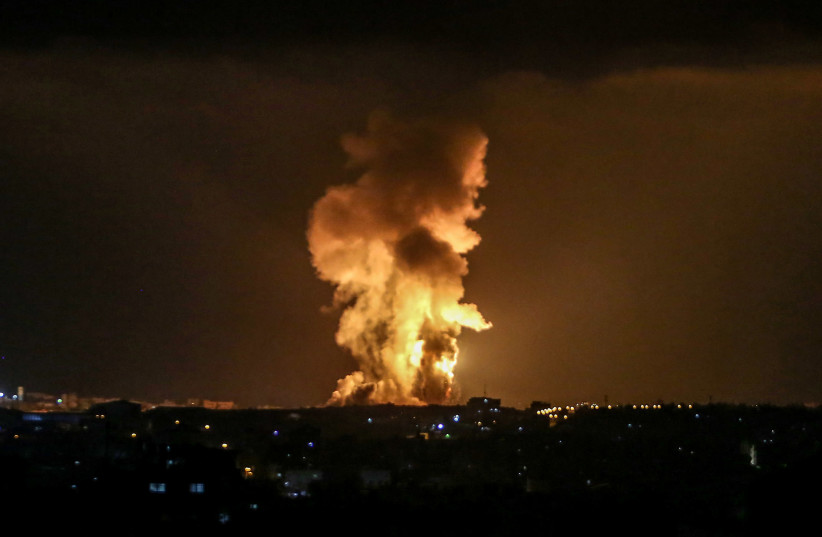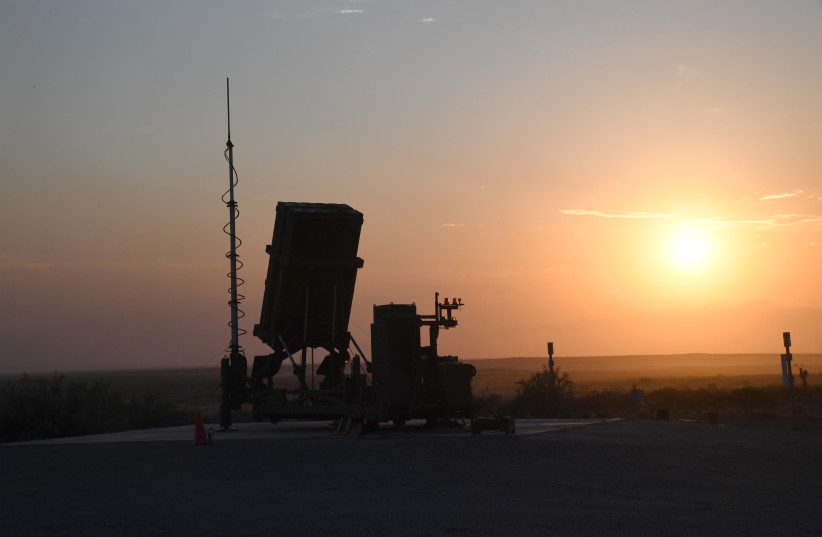The Israeli Air Force struck targets in the Gaza Strip overnight on Thursday in response to earlier rocket fire launched towards southern Israel.
The first rocket fired from Gaza occurred around 10:30 p.m., with a rocket damaging a parked car and a wall near a home in the college city of Sderot.
The rocket did not explode but several people were treated for shock including a 70-year-old man who was transferred to the hospital. Six other people were injured while seeking shelter, with four transferred to the hospital for medical treatment.
Iron Dome (credit: MINISTRY OF DEFENSE SPOKESPERSON’S OFFICE)Iron Dome (credit: MINISTRY OF DEFENSE SPOKESPERSON’S OFFICE)
In response, the IDF said that fighter jets targeted a military post and a tunnel complex in the Hamas-run enclave “containing raw chemicals used for the manufacturing of rocket engines.”
The IDF said that the strike dealt “a significant blow” to the rocket production process in Gaza.
In a Thursday meeting with Israeli political leaders representing towns near Gaza, Defense Minister Benny Gantz assured that security forces were prepared for a variety of scenarios, and would take the necessary measures to maintain the security of Israeli citizens.
During the airstrikes, terrorists in the Strip fired anti-aircraft missiles, the second time in a row that such a system was used.
On Tuesday during retaliatory Israeli strikes on the coastal enclave, Hamas fired a Russian-made Strela (SA-7) shoulder-to-air missile.
The IDF said that the attempts to hit the planes, both on Tuesday and Thursday, failed and no damage had been caused.
Despite initial reports suggesting four rockets were fired toward Sderot during the overnight strikes, the IDF said only one rocket was actually launched, stating all other instances of sirens sounding in southern Israel throughout the night were due to machine-gun fire from Gaza.
Prime Minister Naftali Bennett must respond to the attack, Sderot Mayor Alon Davidi said at the scene. “It was a miracle no one was hurt. It is the government’s responsibility to ensure Sderot residents can enjoy the Passover holiday in peace,” the mayor added.
During a visit on Tuesday afternoon to the Judea and Samaria Border Police, Defense Minister Benny Gantz warned that Israel would not allow for continued rocket fire from the Hamas-run enclave.
“The IDF is ready with a wide range of means and targets – so that peace and stability will continue,” he said.
“If the incitement and rocket fire continues – the terrorist organizations will be severely harmed, as will the people of Gaza, who are currently benefiting from the moves we have made to develop the economy and allow them to work in Israel,” he warned. “These are moves that we will expand if the stability continues or we can go backward, if the Hamas leaders decide to harm it.”
The rocket fire comes as tensions mount surrounding the Temple Mount as dozens of Palestinians have been injured and hundreds arrested following violent clashes with Israel Police.
Israeli officials believe that while Hamas is not interested in any conflict, their major concern is that the violence in Jerusalem might spiral and lead to other terror groups in the Strip launching rockets into Israel-therefore dragging the country into yet another war.
Last year violence on the Temple Mount coupled with the cancellation of Palestinian elections led to Hamas firing seven rockets toward Jerusalem leading to 11 days of deadly conflict called Operation Guardian of the Walls by the IDF and Sword of Jerusalem (Saif al-Quds) by Hamas.
Hamas official Izzat al-Rishq said Thursday morning that the Israeli strikes on the Gaza Strip “will not affect the will and steadfastness of our people,” stressing the insistence of the Palestinian resistance to continue defending Jerusalem, al-Aqsa and the other holy sites, he said that the “equations imposed by the battle of Saif al-Quds were irreversible.”
Egypt, Qatar and the United Nations have been mediating between Israel and Hamas in order to calm the tensions and prevent further violence.
Source:

